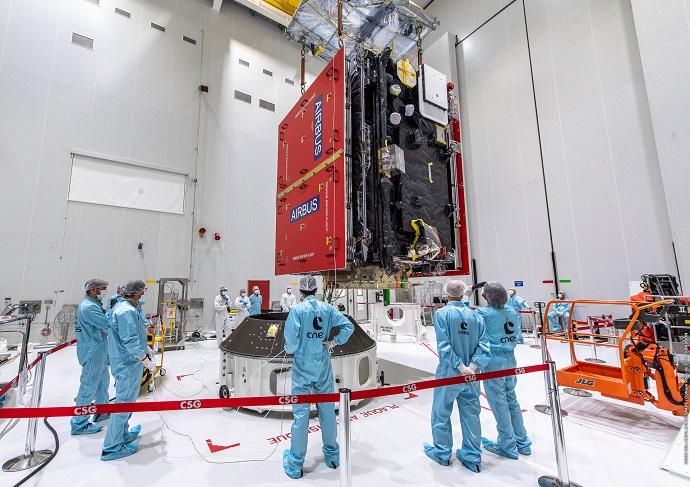The European Space Agency (ESA) is scheduled to launch the historic JUICE mission to planet Jupiter on Thursday, April 14, 2023 at 15:15 (Israel time). The spacecraft will be launched atop an Ariane 5 launcher and embark on a 900 million kilometer journey to Jupiter where it will orbit its moons Europa, Ganymede and Callisto over a period of four years.
JUICE will be ESA’s biggest and most prestigious mission to date. It contains 12 scientific experiments, including an Israeli experiment led by the Weizmann Institute of Science. The experiments are designed to investigate, among other phenomena, whether subterranean oceans exist on Jupiter's moons and whether they harbor the conditions necessary to sustain life.
The Israel Space Agency, in the Ministry of Innovation, Science and Technology, joined up with the Italian Space Agency (ASI) to conduct groundbreaking scientific experiments on the JUICE spacecraft. The Israel Space Agency has funded the development and manufacture of AccuBeat's USO instrument, as well as the scientific experiment of Professor Yohai Kaspi of the Weizmann Institute of Science, the principal investigator for atmospheric hydrodynamics in the mission, which will use the USO instrument.
The USO instrument from AccuBeat, the sole manufacturer of atomic clocks in Israel, and one of only five on the globe, is the most accurate space oscillator in the world for the measurements required. The instrument, which incorporates a GM3 system supplied by the Italian Space Agency, enables the spacecraft to perform a series of experiments, while also functioning as part of the spacecraft's global communications system with Earth.

These innovative systems on the spacecraft will enable it to acquier new data and produce new scientinfic findings. A team of Israeli researchers, led by Professor Yohai Kaspi of the Weizmann Institute of Science, has spent the last several years planning the spacecraft's path which would enable it to messure Jupiter’s winds and how they are affected by gravity and the magnetic field prevailing there.
Another nine experiments on the spacecraft incorporate chips from Ramon.Space Ltd., which the Israel Space Agency also supports. Ramon.Space Ltd specializes in the manufacture of radiation-proof processors.
The launch rocket will display the painting that won first prize in a European Space Agency competition in which thousands of children sent in their own paintings from all over the world. Hundreds of paintings were also sent in from Israel, one of which will be included in a special calendar issued by the European Space Agency before the launch.
Uri Oron, Director of the Israel Space Agency in the Ministry of Innovation, Science and Technology: The Israel Space Agency is proud to be taking part in the European Space Agency's flagship mission, both in terms of engineering and technology, and in terms of research. AccuBeat, at the global forefront of atomic clock development and use in space, is an example of the outstanding engineering capabilities found in Israel. Without a doubt, the research that will be conducted at the Weizmann Institute will constitute a key component in the mission's research program and will continue to advance space research in Israel and position it amongst the global leaders in the field."
Professor Yohai Kaspi of the Weizmann Institute of Science: "When I approached the Israel Space Agency a decade ago with the idea for an Israeli experiment on the JUICE mission, it sounded totally far-fetched. By joining forces with AccuBeat, and with a lot of support from the Israel Space Agency, we succeeded in building the first Israeli experiment of its kind. By sending a radio beam from the spacecraft through the atmosphere, we will be able to measure minute changes in the beam's frequency thanks to the accurate clock. In this way, every orbit of Jupiter will give us a temperature profile at a specific point, enabling us over the duration of the whole mission to build a three-dimensional map of Jupiter's atmosphere. The data will then enable us to understand the structure and composition of the first and biggest planet in the solar system."
Benny Levy, CEO AccuBeat: "For seven years, the best Israeli minds developed and created the most stable clock in the world for deep space missions - a technological masterpiece on a global scale. AccuBeat's vast experience and knowledge helped the development of technology with unprecedented capabilities. We are proud and excited to be a part of a historic research project the results of which will lead to sensational discoveries in the world of science, space and humanity as a whole".











